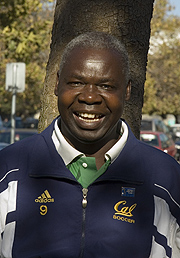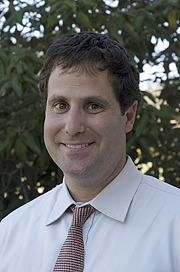Berkeleyan
Faculty Athletic Fellows program goes beyond good sportsmanship
New program gives Cal athletes a competitive edge off the playing field
![]()
| 20 October 2005
Sam Mchombo's linguistics classes regularly attract a cross-section of
student-athletes. Several semesters ago, two-thirds of the men's basketball team was enrolled in his Swahili class.
 Sam Mchombo (Wendy Edelstein photos) |
"I was one of the people who really misunderstood athletes," Mchombo says. The associate professor underwent a transformation three years ago, when he attended Faculty Night, an annual event the Athletic Study Center holds to increase understanding between faculty and entering freshman athletes. Whereas previously Mchombo grappled with student-athletes' occasional absences, now he accommodates players when they return from road trips by offering make-up sessions to ensure they don't struggle or lag behind.
"We love sports at Berkeley and want our students to project the great image of our institution. At the same time, we forget that for them to give us that glory, they must put in a lot of time," he says.
Mchombo's support of student-athletes now extends beyond the classroom, thanks to a program launched last fall by the Athletic Study Center, a unit of the Division of Undergraduate Education offering a range of academic support services to student athletes. Faculty Athletic Fellows is intended to help foster the success of student-athletes off the field. While cheering on the women's soccer team from the sidelines, Mchombo also has an "informal arrangement" with the players, where he encourages them to talk to him about any academic challenges they are experiencing.
Faculty Athletic Fellows is designed to "enhance the relationship between student-athletes and faculty, and build intellectual, academic, and career-oriented mentorships," says Derek Van Rheenen, director of the Athletic Study Center. "We're trying to honor the institutional commitment to these young men and women," he says, "and help them realize their academic, as well as their athletic, potential."
Within 48 hours of e-mailing the program's invitation last fall, the Athletic Study Center received 50 responses from interested participants - more than enough to pair each of the campus's 27 intercollegiate sports teams with a faculty member. Faculty involvement can take any number of forms: talking to recruits, meeting with athletes interested in majoring in their field or their research, attending the Student Athlete Academic Awards Banquet, cheering from the bench at home games, or traveling with the team to away games. Faculty participants come from all over the campus - from architecture to the sciences to the business school.
Getting in the swim of things
 Mark Brilliant |
Last year, to kick off his involvement with the team, Brilliant introduced himself to the coaches and the athletes and attended swim meets. His key contribution, he says, came when he introduced a visiting high-school senior, who had expressed interest in fuel cells, to Daniel Kammen, a professor in the Energy and Resources Group, who is researching the energy-saving technology. While Brilliant can't be sure that the meeting swayed the student to opt for Berkeley, he will say that the student is now a freshman swimmer who works as a research assistant for that same faculty member.
Brilliant calls swimming "formative" to his own intellectual development. "I see no reason why the discipline required to be the caliber of athlete that Cal draws shouldn't translate into the same discipline and excellence in the classroom. My ultimate goal in being involved in the program is to make sure the students I work with make that connection, if they haven't already."
His own days as an intercollegiate swimmer enable Brilliant to relate to the student-athletes' situation. "I think just having someone on the faculty to whom they could talk about juggling life as a Division I athlete at a world-class academic institution is invaluable," says Brilliant, who has shared his e-mail address and office hours with the team. "I didn't go to a school that was the same caliber as Berkeley, but it did have a Division I program, so I know a little bit about that challenge."
A sense that faculty are people
Jill Malko, head coach of the lacrosse team, thinks that simply the presence of her team's Faculty Athletic Fellows - Ed Epstein, professor of international and area studies, and Professor of Public Health Cathy Koshland, the campus's vice provost for academic planning and facilities - subtly benefits her players.
"Even if a kid never interacts with them one-on-one, they get a sense that faculty here are people. Berkeley is a big place, and because of their role, many of the professors here can appear intimidating," says Malko. "The Faculty Athletic Fellows really help break down that stereotype."
Dismantling those stereotypes is a critical piece of the Faculty Athletic Fellows program, says Van Rheenen. "Ideally, some of the misconceptions faculty hold about student-athletes will get deconstructed through this process, so that faculty become the best recruiters of their colleagues," says Van Rheenen. "Student-athletes are not singularly identified individuals who only care about their sport. They have real academic and intellectual passions."
For information, visit asc.berkeley.edu/faculty/fafp_overview.html
or contact Derek Van Rheenen via e-mail at dvr@uclink.berkeley.edu or by phone at 642-0605.

